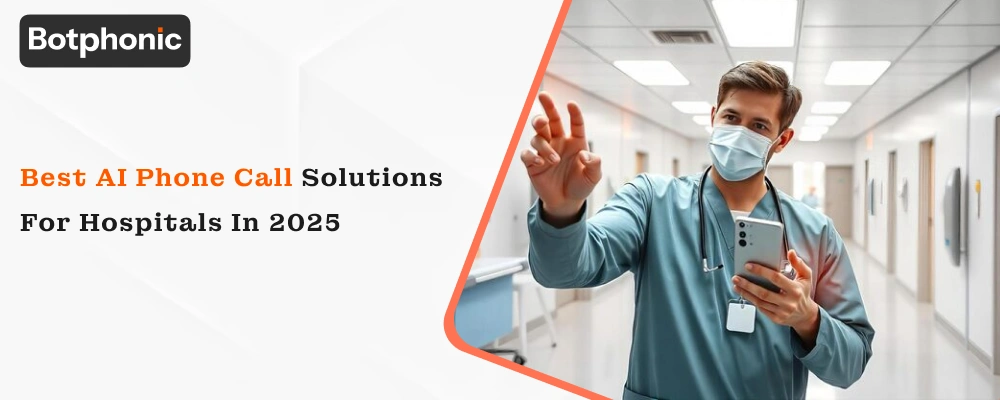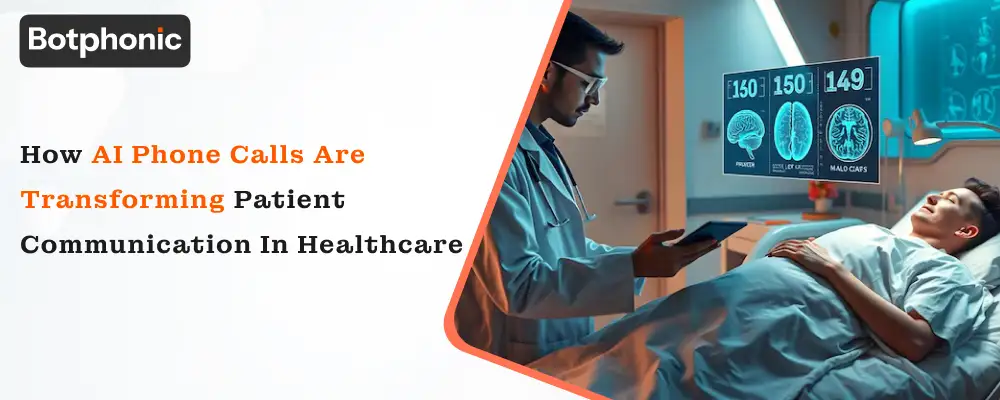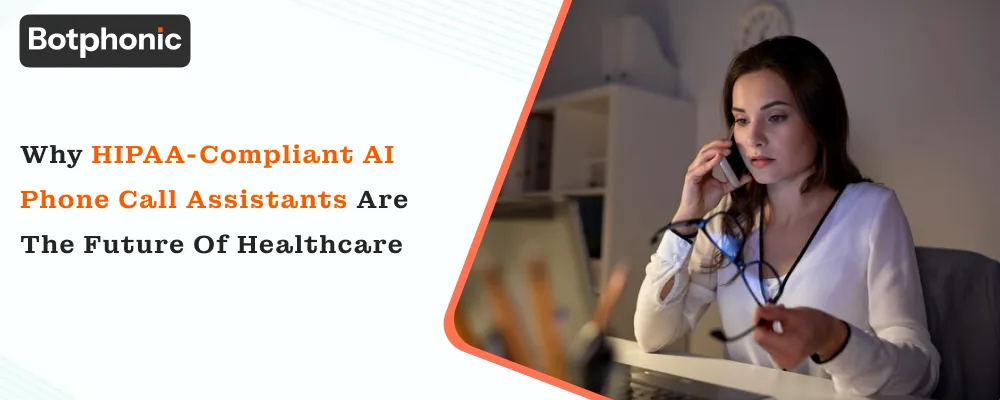
Summarize Content With:
Quick Summary
The healthcare industry is getting into a new world, where HIPAA-compliant AI phone call assistants have become an essential. They have quickly become essential for efficiency, security, and patient satisfaction. Revolutionizing the system from automating appointment scheduling to answering billing queries, AI systems are transforming how hospitals interact with patients.
HIPAA compliance still remains the foundation of this revolution, which ensures that every conversation, transcription, and data exchange stays secure and confidential. Combining artificial intelligence, NLP, and voice automation, healthcare providers can easily provide faster and more accurate services with accessible communication, without even compromising patient trust.
In this blog, we will be discovering why HIPAA-compliant AI phone call assistants have become an essential in the healthcare industry. We will also be uncovering the growing aspect of AI in healthcare, along with its key features.
Introduction
AI phone call assistants are rapidly changing the healthcare vista, shifting majorly relevant tasks from manual to technology. In 2026, this revolution is going to set the pace higher than ever and will definitely redefine how clinics are going to handle patient communication, documentation, and scheduling.
Not just via blogs or articles, even on numerous social media platforms, doctors and other people are discussing how AI is taking stress off their shoulders and helping them manage their tasks efficiently. Even on Reddit, one healthcare provider stated that he used to spend almost two hours every night just finishing up the notes, but now AI just scribes it while he talks to patients.
Data security is a major aspect every organization should prioritize, but in healthcare, it has become of utmost importance. Moreover, staying compliant with regulations like HIPAA is one of the constant challenges that many face. With increasing demands for enhanced patient care while increasing efficiency, the healthcare sector has turned to AI to meet these demands.
The Growing Role of AI in Healthcare Communication
Artificial intelligence has already proved its worth across many industries. But, telehealth has moved the margins; it has become routine now. Doctors are now able to see patients through a screen, run follow-ups over video. People are getting care without even having to drive all the way to the clinic. The new thrill is how effectively AI phone call assistants are getting linked into these telehealth systems. The healthcare sector no longer just belonged to treatment, but it also required talking, documenting, verifying, and even following up.
In the past, organizations used to rely heavily on traditional call centers, where human agents had to answer calls, schedule appointments, and respond to inquiries. But with these smart AI systems, they are now collecting forms, answering basic questions, and writing up notes after a call. It’s no longer just a fiction but has become a part of the workflow.
Why HIPAA Compliance Matters for AI in Healthcare?
Firstly, let’s know what HIPAA compliance is. In 1996, the Health Insurance Portability and Accountability Act (HIPAA) was introduced. Ensuring that healthcare information is protected and secured.
It has three main objectives:
- To make health insurance accessible for everyone.
- Protect the security and confidentiality of healthcare information.
- Also, assists the healthcare industry in managing its administrative costs.
These regulations manage how healthcare providers handle patient data and ensure that it remains confidential and secure. When implementing AI in healthcare, it’s important that any solution, especially those that are dealing with sensitive patient information is adheres to HIPAA regulations. Let’s see what makes an AI phone assistant HIPAA-compliant:
What Makes an AI Phone Assistant HIPAA-Compliant?
A HIPAA-compliant AI phone assistant affirms that patient data is securely shared and stored by following strict encryption standards. Let’s check out some key features that make these AI systems compliant:
- Data Encryption: Patient’s informations is encrypted even when in transit or at rest. It ensures that no unauthorized parties are able to access this sensitive data.
- Access Controls: To prevent breaches even from within the system, only authorized personnel or systems can access patient data.
- Audit Trails: HIPAA-compliant systems are now allowed to keep detailed logs of all the data interactions, so whenever anyone has accessed patient details, it can be tracked and reviewed.
- Secure Cloud Storage: Data is now stored securely within HIPAA-compliant cloud environments, which ensures that it’s protected from external and internal threats.
Additionally, meeting these legal requirements, HIPAA-compliant AI phone assistants also aid in building trust with patients. Now, patients are more likely to engage with healthcare providers who prioritize their privacy. Moreover, they trust someone who ensures that their personal data is protected at all costs.
Key Features of HIPAA-Compliant AI Phone Call Assistants
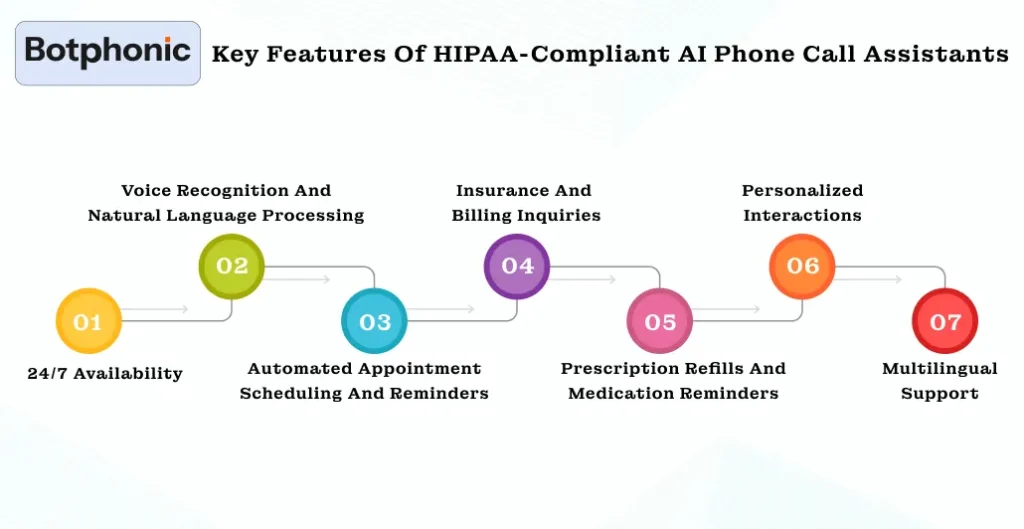
AI phone assistants have become more than just automated voice systems; they are coming packed with features that can improve overall healthcare operations. Let’s look at some of the key features that make it a game-changer for healthcare providers.
1. 24/7 Availability
AI phone assistants can easily function around the clock and ensure that patients have access to their informations and services. Even if it’s after hours. Whether patients like to schedule an appointment at midnight or they just want to ask for medical advice, patients won’t have to wait for business hours and can get their query resolved instantly.
2. Voice Recognition and Natural Language Processing
Modern AI phone assistants are actively using advanced voice recognition and NLP to acknowledge and answering it to promptly in a natural and conversational manner. It also allows patients to experience that they are interacting to a real person, even if they are not.
3. Automated Appointment Scheduling and Reminders
Booking, rescheduling, or cancelling an appointment has become easier for patients, as they don’t even need any real human interaction for the same. Plus, the system is designed in a way that it sends reminders and confirmations to reduce no-shows and effectively improve scheduling efficiency.
4. Insurance and Billing Inquiries
AI call assistant can assist in answering common billing questions, verifying insurance coverage, or just providing information about out-of-pocket costs. It also reduces the workload of human staff and frees them up for managing inquiries that actually need human attention.
5. Prescription Refills and Medication Reminders
For prescription refills or medication reminders, it can all easily be handled by an AI assistant. With this automated approach it ensures that patients remain compliant with their treatment regimens.
6. Personalized Interactions
With continuous learning of AI models from past interactions, AI phone assistants can easily offer an enhanced personalized experience over time. Making each interaction feel more instinctive aids in building a stronger connection between patients and their healthcare providers.
7. Multilingual Support
AI phone assistants are programmed to support not just one but multiple languages. With multilingual support, accessing healthcare has become easier for diverse populations.
How AI Is Transforming Healthcare Call Centers
Healthcare call centres have always played an essential role in managing patient interactions. However, traditional call centers used to struggle with sudden high volumes of calls, long waiting times, and operational inefficiencies. Integrating with a HIPAA-compliant AI phone assistant, healthcare organizations can easily optimize their call center operations in numerous effective ways.
Let’s know them in brief:
- Faster Response Times: AI phone assistants have always been handling multiple calls at once, which has also drastically reduced wait times for patients.
- Accurate Call Routing: AI systems can route calls to the appropriate department autonomously, based on the inquiry. This also helps in eliminating the need for patients to ask about multiple agents.
- Cost Savings: By automating routine tasks, healthcare organizations can just reduce staffing costs and reallocate resources to other areas where they are actually required.
- Higher Patient Satisfaction: AI assistants effectively improve response times and reduce errors that ultimately lead to higher patient satisfaction.
The Influence of AI on Patient Engagement and Satisfaction
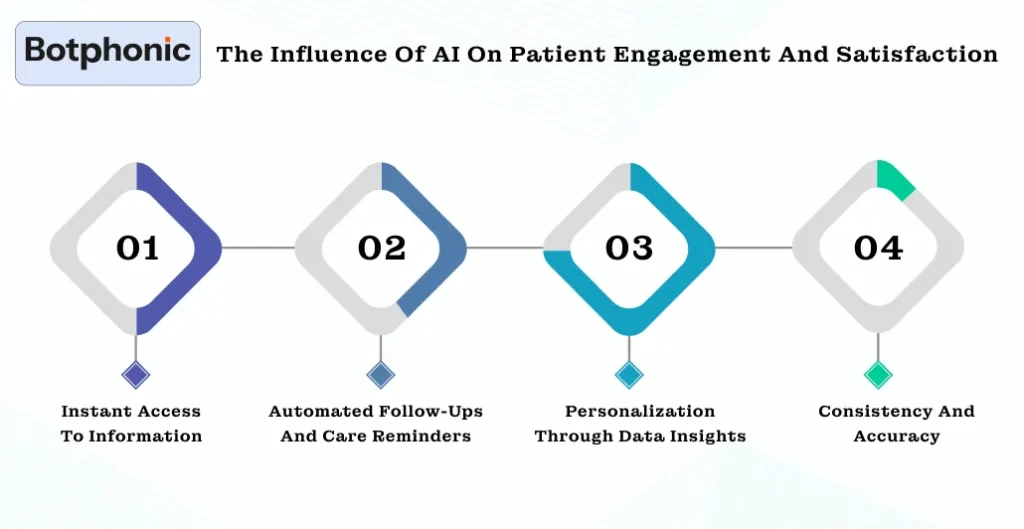
One of the foremost aspects of healthcare is patient engagement, which explains that the more the patient is engaged, the more chances there are to follow through with treatment plans, attend appointments, and stay on top of their health. AI phone assistants also help in improving patient engagement by offering convenient, timely, and accurate interactions.
1. Instant Access to Information
Patients no longer have to wait for the doctor’s office to open to get answers to their simple inquiries. AI phone call solutions grant immediate, round-the-clock access to important information which is, for example, office hours, billing questions, and prescriptions, and thus patient satisfaction is increased.
2. Automated Follow-ups and Care Reminders
AI phone assistants can keep track of their patients’ progress and get in touch with them after the appointment to be sure that they follow up, have the correct info, and are still on their way to recovery. Besides that, sending out reminders for medication refills or upcoming check-ups helps keep patients involved in their healthcare habits.
3. Personalization Through Data Insights
AI systems gain knowledge from every interaction. That means over time, the assistant will be able to provide a more personalized service based on the particular needs of the patient. Be it remembering a patient’s preferred language or being aware of their health needs, AI can adjust the communication accordingly, making it more satisfactory.
4. Consistency and Accuracy
AI assistants give a uniform experience to every patient, which is contrary to human agents who might be exhausted or easily distracted. Moreover, there is no chance of mix-ups in appointment times or misinterpretation of doctor’s orders; thus, the chances of communication breakdown are greatly diminished.
Implementation: How to Bring AI into Your Healthcare Workflow
The incorporation of an AI phone call assistant in a healthcare setting doesn’t just necessitate a change of habit; it does, in fact, require a perfect union between the new technology and the old ones in such a way that it still retains the existing workflow, people, and
patient experience. A successful introduction does not only depend on technical aspects but also on planning, communication, and alignment between the departments. Here is how to do it well:
Step 1: Identify Communication Pain Points
The very first thing to do is to draw a picture of the points where the communication system you currently have is letting you down.
Are patients voicing their dissatisfaction because of long wait times?
Are staff getting inundated with administrative calls?
Is it the case that you have trouble with appointment no-shows or inquiries after hours?
Finding these problems out will enable you to figure out the one area in which an AI-assisted phone attendant could make the most impact, be it appointment scheduling, call routing, billing inquiries, or prescription requests.
Step 2: Choose a HIPAA-Compliant AI Provider
Creating an AI system that is perfect for all medical hospitals is practically impossible. When you are going to select an AI phone call assistant, make sure the provider proposes HIPAA compliance, secure cloud hosting, encryption, and access control.
Moreover, you should consider:
- Simple integration with your Electronic Health Record (EHR) system
- Multilingual and customizable conversation flows
- Ongoing support and analytics dashboards
Choosing the best partner puts in place a solid base for a smooth rollout.
Step 3: Integrate the AI Assistant with Existing Systems
The moment your AI assistant is picked, it should link up with scheduling software, EHR, and communication platforms right away. Because this guarantees that all patient data appointments, prescriptions, and follow-ups will be transferred between systems automatically.
The integration process diminishes manual data entry and ensures that the staff is always provided with real-time patient information.
Step 4: Train Your Staff
Artificial Intelligence (AI) takes care of a big part of communication, but the staff are still the ones who have the main say. The training should be centered around:
- How to oversee AI’s communication with users
- When to get personally involved in a case that is either complicated or sensitive
- How to manage AI forward cases
Adoption becomes easy-going and collaborative when the staff perceives the AI as a partner and not a replacement.
Step 5: Pilot, Measure, and Optimize
Take baby steps; conduct a pilot in one department or for just one use case (like appointment booking).
Keep an eye on such metrics as:
- Avg. call handling time
- No. of automated vs. human-handled calls
- Patient feedback ratings
The data should be utilized for your AI assistant’s responses to be fine-tuned and for performance improvement before the organization-wide expansion.
To summarize: the success of implementation is when AI naturally fits into the already existing operations, wins the staff’s trust, and also enhances measurable outcomes from the very first day.
Stop depending on traditional call handling and increase your efficiency, accuracy and patient satisfaction.
Contact Botphonic Today!!!Bringing AI to Your Healthcare Practice
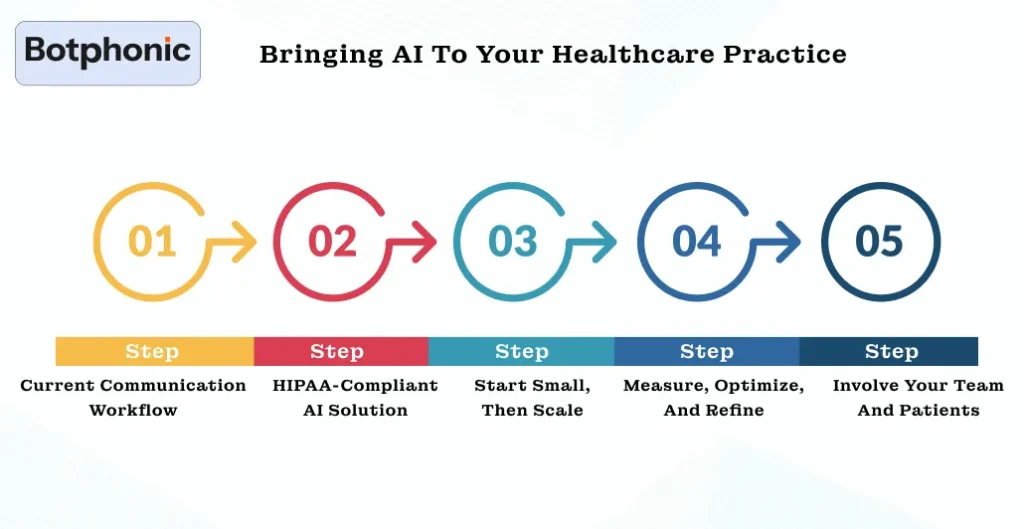
If your healthcare organization has been taking care of patient calls in the old-fashioned way, this is the right time to change. HIPAA-compliant AI phone call assistants not only come with great convenience but also change the way you run your processes in terms of security and efficiency.
The following is a very practical roadmap to help you get started:
1. Evaluate Your Current Communication Workflow
Inspect very closely the different points where time and money are being wasted; this could be through long hold times, missed calls, or administrative pressure. Then point out the areas that will benefit most from automation.
2. Choose a Proven, HIPAA-Compliant AI Solution
Get the services of an AI company that not only provides good quality technology for the healthcare sector. But also complies with extremely tough HIPAA, SOC 2, and GDPR standards. Make sure that the service provider can guarantee:
- Impeccable connection with your EHR/EMR systems
- Complete confidentiality and security of data
- Flexible dialogue flow that meets the needs of your patients
- Pricing that is appropriate to the size of your clinic and can expand as you grow.
3. Start Small, Then Scale
First of all, implement full automation for only a single operation, maybe it is scheduling appointments or sending out reminders for follow-up. After the staff and the patients have gotten used to it, the automation can be extended to other operations. For instance, a billing inquiry, prescription management, and patient surveys.
4. Measure, Optimize, and Refine
Monitor the impact that the AI has on your KPIs: fewer missed calls, shorter waiting time, higher patient satisfaction rate, and lower number of employees required. Take advantage of these observations to make adjustments and continue to increase the performance.
5. Involve Your Team and Patients
Being transparent with your team and patients will help to create trust. Prepare your people to collaborate with AI instead of competing against it, and let the patients know that although they are interacting with the system, their privacy is being respected and secured.
Conclusion
The integration of HIPAA-compliant AI phone call assistants marks a turning point in healthcare’s digital journey. Maybe it did seem futuristic, but automation along with personalized patient communication, have already become a daily reality across several hospitals, clinics, and telehealth networks.
These assistants are not just here to replace admin staff, but they are actively empowering them. AI phone call assistants are actively taking on repetitive and time-consuming tasks that also allow medical professionals to spend more time where it actually matters. Meanwhile, patients are now able to enjoy quicker response with reliable support, and also ensured that their data is managed safely and in full compliance with HIPAA regulations.
